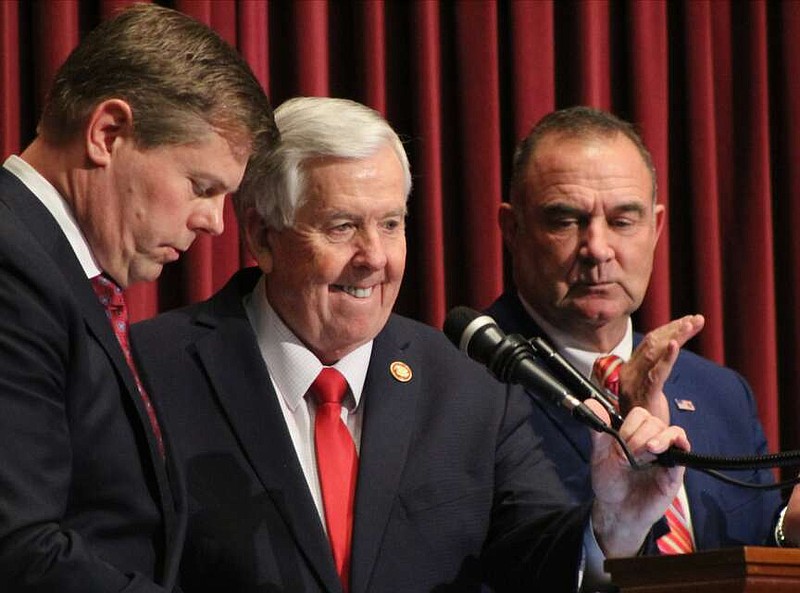Missouri Gov. Mike Parson's record $52.7 billion budget proposal would help address one of the largest issues he said affects the state's economy: a lack of accessible child care.
Parson proposed a $51.7 million investment in the state's child care subsidy program to ensure children receive quality care. The investment would increase subsidy rates for infants, toddlers, preschoolers and school-aged children from the 58th percentile to the 100th percentile for infants and toddlers and the 65th for older children, according to the executive budget documents released as part of the speech.
The planned investment was based on recent market studies, according to the documents.
During Wednesday's State of the State address, Parson said Missouri was losing an estimated $1 billion a year due to the child care crisis, while most Missourians also believe early childhood education is vital to future success. Parson said the state only has the capacity to serve 39 percent of the state's children.
He pointed to a bipartisan, bicameral legislative effort to boost the child care industry as a priority for the year during the State of the State address. Rep. Brenda Shields, a St. Joseph Republican, and Sen. Lauren Arthur, a Kansas City Democrat, both sponsored bills that would authorize a child care contribution tax credit, employer-provided child care assistance tax credit, and the child care providers tax credit.
Both iterations of the bill made it out of their respective committees during the past couple of weeks and are awaiting their time on the floor.
Parson told reporters Thursday he hoped to see the state partner with the business sector to remedy the issue and boost the economy, though he said over-reliance on the government to fix the issue wasn't a solution.
"I think you want to look outside the box," Parson said. "Any time we can start partnering with the private sector and helping them, we're much better off."
The governor's recommendations also include $125 million in federal funding for child care discretionary spending, $78 million for child care subsidy payments and $15 million for transitional child care administration and associated costs.
The budget also includes $4.6 million in the Child Care and Development Block Grant Federal Fund.
Child care is a top concern of business groups and advocates across the state, with local and statewide groups supporting the tax credit proposals during the past two legislative session. The state and local chambers of commerce kept the push going over the interim after Shields' bill was sunk by dysfunction in the upper chamber last session.
Kara Corches, Missouri Chamber of Commerce and Industry vice president of governmental affairs, told lawmakers last week the issue has led 9 percent of parents to leave their jobs.
"It's really hard to find child care," she said. "If you are lucky enough to find it, can you afford it? This legislation has the dual impact of expanding the capacity of child care infrastructure and supporting businesses that want to help their employees."
As for the Jefferson City area's largest employer -- state government -- Parson proposed a 3.2 percent raise across the board. The proposed budget also includes a raise for state workers who stick with hard-to-fill jobs in residential facilities such as youth incarceration centers, state schools and mental health facilities, a 1 percent bump for every two years worked up to 10 percent.
Parson also proposed a $54 million boost to the MoExcels workforce training program on college campuses, a boost to workforce development efforts that included the state's career readiness programs created or overhauled during the past few years. He also backed a $3 million investment in Missouri's youth apprenticeship programs.
Parson also proposed a $10 million investment in advanced semiconductor research, development, and skills training alongside $7 million for critical mineral development efforts.
Other business-related items outlined in the annual speech included a $1.7 billion investment in broadband development that former U.S. Sen. Roy Blunt helped secure, an allotment Parson said could bridge the digital divide for the state in the next five years. Parson noted his administration pushed a $400 million appropriation to aid the effort in recent sessions.
Parson also pointed to $15 billion in new business investments and 110,000 new jobs created during his six years in office among his top achievements as he prepares to leave office.
Other proposed investments into business and the economy include $6.5 million for the Department of Agriculture's Agriculture Business Development Division and $302 million into the Department of Economic Development's Business and Community Solutions Division.

